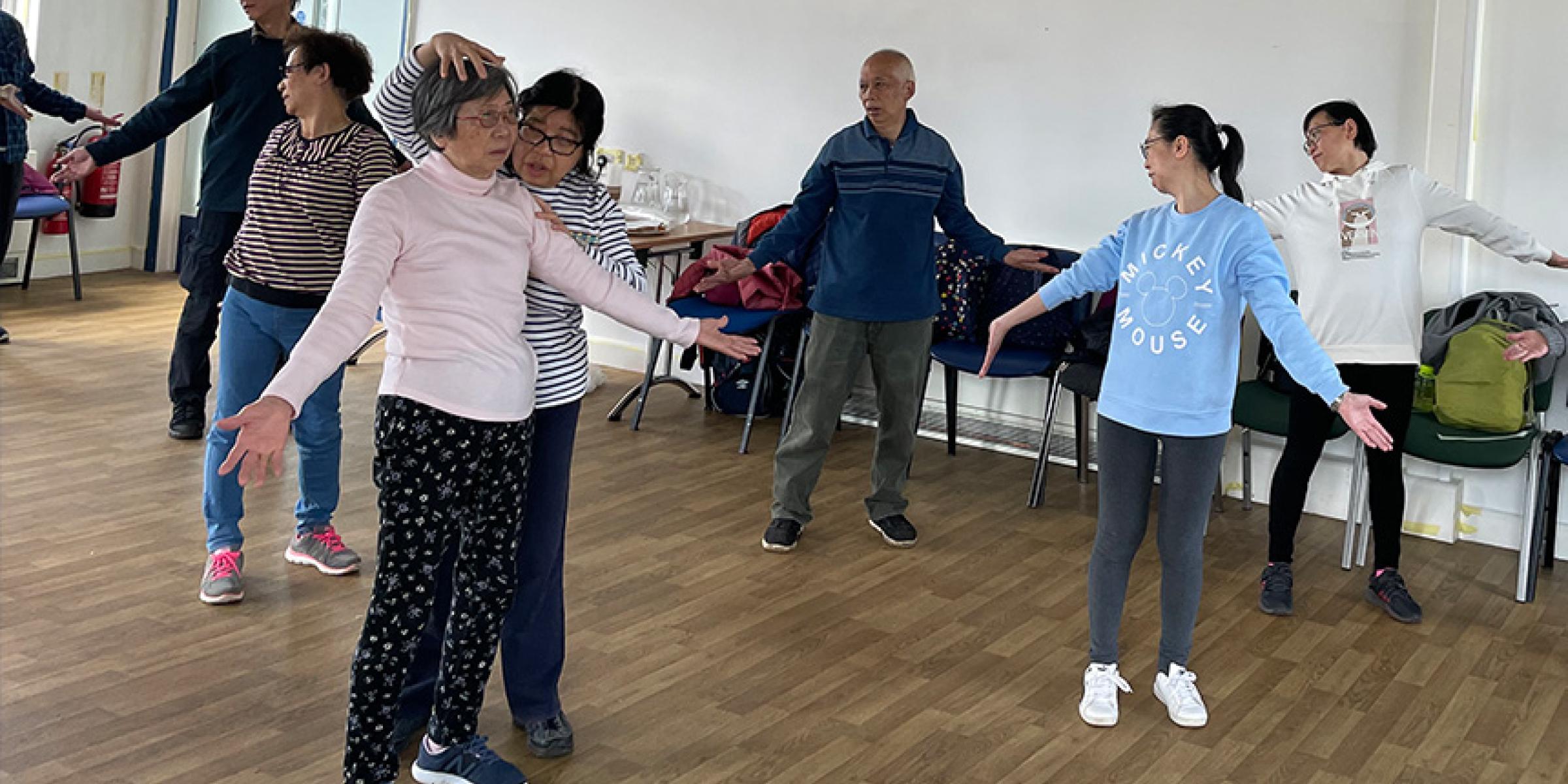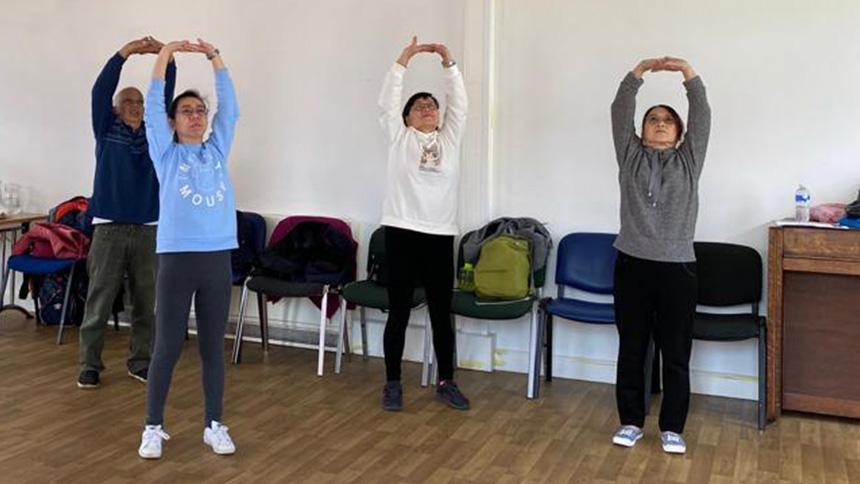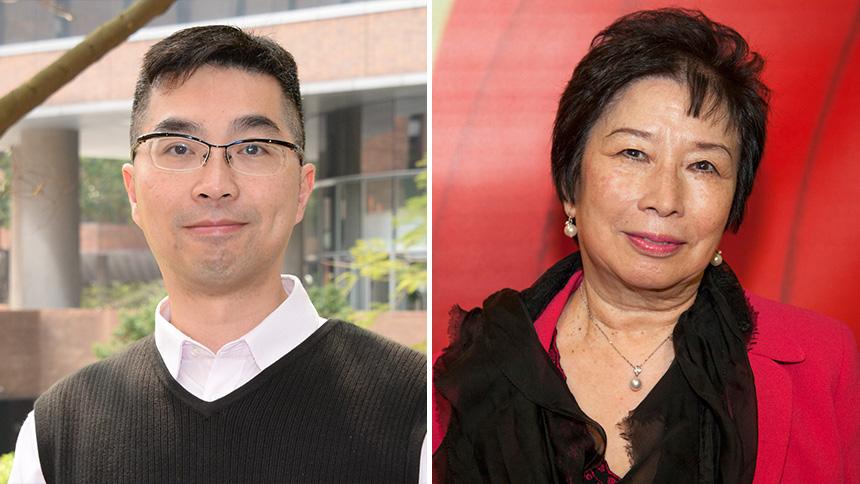
Gentle exercises, meditation and breathing for people with dementia
Qigong sessions developed with Bristol’s Chinese speaking communities are benefitting people living with dementia.
People in and around Bristol are enjoying newly developed sessions for people living with dementia, as part of a Chinese Community Wellbeing Society (CCWS) project.
CCWS, created in 1989, supports the health and social care needs of the Chinese speaking community across south-west England through a range of services.
Among them is a free helpline and a replacement care service.
A Dementia Support Hub is also available for carers from East and South-east Asian communities.
Tailored services
Tailoring its services is vitally important to CCWS and the latest sessions were no exception. They were created in tandem with people with dementia.
‘Our project comes under the Dementia Health Integration Team of Bristol Health Partners,’ says Emily Choi at CCWS.
‘It’s called Dementia Arts Intervention, but “art” can be music, art therapy, gentle exercises like qigong – anything that people with dementia would enjoy.
‘We’re just one of the partners delivering the programme to see how arts can help improve the wellbeing of those living with dementia.
‘The activities are very much based upon discussions with people from the East and South-east Asian community. We collated all their feedback and they decided they would like gentle exercises.’
Project co-facilitator Kelly Zhang says people can take part in the sessions even if they don’t enjoy painting or drawing.
‘Probably you think art would just be drawing,’ she said, ‘But maybe a few of them are not Picassos and think, “Well I can’t do that.” These exercises are more meaningful to them.’

Safe and beneficial
Around 20 people joined one of the early sessions – both in person and online – to take part in qigong (pronounced chi-gong) which involves meditation, breathing and movement.
‘Qigong is a form of “soft” martial arts performed by the Chinese for thousands of years to enhance our minds with physical movements,’ says Rosa Hui, Director of CCWS.
Leading the session was Sunny Chan, a senior lecturer at UWE Bristol.
He has researched the benefits of mindfulness and exercises like qigong, which he believes can benefit people living with dementia.
‘I spent several years in Hong Kong conducting research, teaching and practising qigong and tai chi,’ says Sunny.
‘This is a safe and beneficial mind–body intervention for people with dementia. Psychological health can be improved by reducing stress levels and physical function, including balance, can be enhanced.’
‘Frequent practice may also enhance cognitive function, like memory and attention.’

Sunny Chan and Rosa Hui
Easy to follow
The session exercises could be done sitting down – beneficial for the group, as many are over the age of 80.
Carers were also welcome, which Kelly says helps to relieve isolation and stress as well as improving their relationships with the person who has dementia.
Fiona and her mum Eliza, who has dementia, attended together.
‘The session was very good and Dr Chan was very professional,’ Fiona said.
‘Even someone with dementia can follow the instructions easily.’
Another member Pauline, who has memory problems, said the session was very easy to follow.
‘I could follow every movement,’ she said, ‘I had to join online due to transportation problems.
‘It’s a good chance to join together (even if we’re not face-to-face) and I could see the good atmosphere too.’
Language and culture
The sessions were in Cantonese, which was important for many group members.
‘We understand the community have got language and cultural barriers,’ says Kelly. ‘We want to illustrate that to local services and tell them that if the tutor is a Cantonese speaker from the same cultural background, it could be much better than a tutor speaking English.
‘If they listen in their mother tongue, they feel more engaged and involved with that activity.’
Providing information in multiple languages is something CCWS strives for across its services.
‘Having sessions in your native language is so much easier and helps people connect with the service better,’ says Emily.
‘Pretty much all our Dementia Support Hub sessions were led by Cantonese speakers and it really made a difference.’
‘Our free helpline is available in English, Cantonese and Mandarin. It offers advice, support, information and can signpost to other organisations.’
‘It’s also important to put information into a culturally appropriate context,’ adds Emily.
‘For example, when talking about struggling with daily tasks as a sign of dementia, we use “struggling to use chopsticks to put food into your mouth” as an example to help them understand the subject matter better.’
Feel confident
Funding for the sessions came from NHS Charities Together and CCWS hopes to continue running them to support people living with dementia lead a healthier lifestyle in the long run.
‘Following the session everybody was really sociable and you could not tell they had symptoms,’ said Kelly. ‘I want them to think, “I can live well with dementia.”
‘People with dementia – don’t feel ashamed, feel confident. You can still live very well with the support of dedicated and proper services.’
Support in your language
Our support line can talk to you in your language. Call 0333 150 3456, say your language and end the call, then a dementia adviser will call you back with an interpreter.

